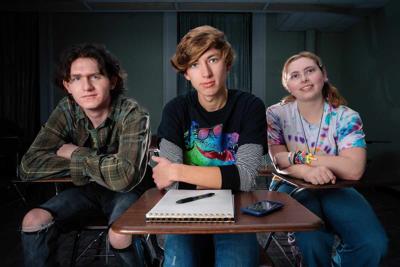KINGSTON — The University of Rhode Island Theatre Department will close out the first half of its season with Stephen Karam’s dark comedy “Speech & Debate,” which opens Thursday, Dec. 7, for a four-day run in the Fine Arts Center J Studio, 105 Upper College Road.
Set in the early 2000s, “Speech & Debate” follows three high school misfits in the conservative community of Salem, Oregon, as they form a speech and debate club to expose a sex scandal within their school. But that description just scratches the surface.
“If you read the synopsis, it sounds like a typical high school comedy, but it’s really, really funny,” said director David Weber, a senior physics and theatre major from Sault Ste. Marie, Michigan. “The writing is so quick, so funny. The characters have such clear voices. It is so intensely powerful and emotional and true to real life, which is not something that you often get with characters this age.”
Weber discovered the play last summer while reading dozens of works to find one for this season’s student-run, main-stage production. Many of the plays Weber looked at missed the mark on how they portrayed the contemporary adolescent experience. But Karam, a two-time Pulitzer Prize finalist and winner of a Tony Award, nailed it with “Speech & Debate,” especially in how technology—such as the internet and podcasts—has drastically changed the high school experience, Weber said.
The play, which debuted Off-Broadway in 2007, has three main characters with distinct identities—Howie, 18, is an openly gay teen who has moved from the more liberal Portland to the very conservative Salem; Solomon, 16, is an awkward, eager-beaver student reporter; and Diwata, 17, is an aspiring actress with no social cues. Dealing with their own issues and secrets, the trio come together as they learn they are each linked to the sex scandal. As they try to bring the scandal into the light, they create a hilarious musical version of Arthur Miller’s “The Crucible,” including a time-traveling young Abe Lincoln.
One of the key messages of the play, said Weber, is that while they may be considered young, adolescents should be respected for who they are.
“Adults get this perception that people this age aren’t completely developed, aren’t able to speak to what they need or what is harming them,” Weber said. “So, they’re often censored and they’re forced into a mold where they are considered not old enough or competent enough to provide input.”
The cast members who play the misfits, not too far removed from high school themselves, bring a level of truth to the play. “In the table readings, it became clear that each of these actors have had experiences so similar to these characters and have been able to bring so much of their own personal experience into fleshing out these characters and making them three dimensional,” Weber said. “It’s really fantastic.”
Jake DeShiro, a freshman majoring in marine biology and theatre, plays Howie; Ethan Clarke, a sophomore theatre major, plays the awkward Solomon; and Joey Lloyd, a senior theatre major, plays the loud and opinionated Diwata. Ella Kenny, a junior theatre major, rounds out the four-person cast, playing roles of a teacher and reporter.
One of Lloyd’s favorite parts of the play is how it portrays young people who are trying to find their way despite the interference of adults and other kids.
“The characters find community together because they have no one else they can be themselves with,” said Lloyd, of Narragansett. “I love how the characters use humor to work through their pain. It’s very realistic and relatable.”
Over the one-act play’s 90 minutes, the audience will become connected to characters who are “very real individuals,” with distinct personalities, said Clarke, of Seekonk, Massachusetts.
“There are so many awkward and uncomfortable moments in the show that will make both the audience and actors cringe,” Clarke said. “While it may seem natural to shy away from such moments, it is by embracing them and laughing at ourselves and these characters that we grow and learn.”
Costume designer EJ Caraveo, a senior theatre major from Tiverton, helps bring out each character’s individual personality by using different color schemes in the contemporary clothing each character wears.
Set designer Kayla Senn, a sophomore theatre major from Long Island, New York, said the set also helps the actors get into their characters. The play moves quickly from scene to scene and Senn uses pieces from a standard classroom, helped by lighting, to create different settings.
— Nancy Burns-Fusaro


(0) comments
Welcome to the discussion.
Log In
Keep it Clean. Please avoid obscene, vulgar, lewd, racist or sexually-oriented language.
PLEASE TURN OFF YOUR CAPS LOCK.
Don't Threaten. Threats of harming another person will not be tolerated.
Be Truthful. Don't knowingly lie about anyone or anything.
Be Nice. No racism, sexism or any sort of -ism that is degrading to another person.
Be Proactive. Use the 'Report' link on each comment to let us know of abusive posts.
Share with Us. We'd love to hear eyewitness accounts, the history behind an article.